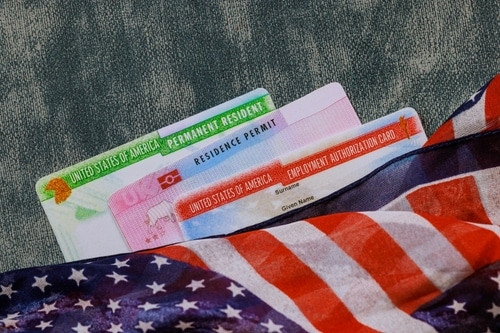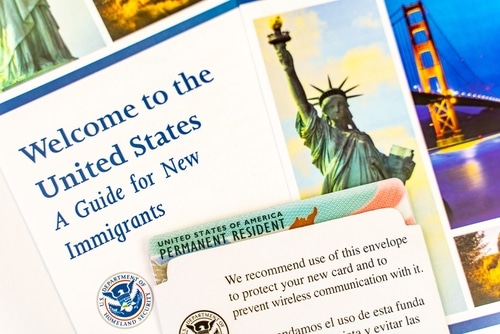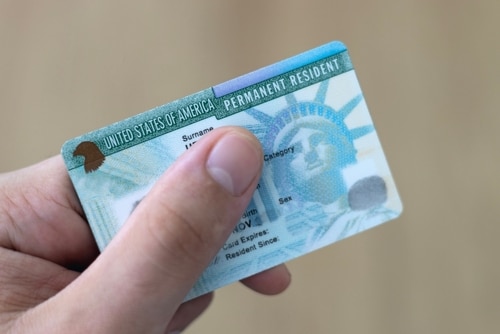Are you considering living and working in the United States for a long time? A green card could be the important next step for you. A green card lets you live and work in the U.S. for good. It’s important if you’re meeting family, starting a new job, or seeking safety and stability. A green card can also help you become a U.S. citizen.
In this guide, we’ll show you what a green card is. You will learn about the different types that exist, how to apply for one, and what you will see once you have it.
What Is a Green Card?
A green card, which is also known as a Resident Card, shows that you have legal permission to live and work in the United States for a long time. A Green Card is a document that allows a person to live and work in the United States. There are several types of Green Cards, and each type has different requirements.
For many immigrants, getting a green card means more than just filling out forms. It is about creating a life in the U.S. This includes starting a job, raising a family, and joining a community.
While some people use their green card to become U.S. citizens, others choose to stay as permanent residents for a long time. Either way, it gives people a chance to do more.
Green Card vs. Visa: What’s the Difference?
People usually confuse green cards and visas, but they have different roles.
- A visa is short-term. It allows you to visit, study, or work in the U.S. for a specific time.
- A green card is long-term. It allows you to live and work in the U.S. for as long as you want and later apply for citizenship.
If you want to make a lasting move to the U.S., a green card is the best choice.

Types of Green Cards
There is no one way to get a green card. It depends on your situation. You can get one through family, a job, a special program, or even a lottery. Here is a quick breakdown:
Family-Based Green Cards
Family reunification is a major reason why people receive green cards.
You may qualify if you are:
- A spouse, child (under 21), or parent of a U.S. citizen.
- An adult child or sibling of a U.S. citizen. (Longer wait times may apply.)
- A spouse or child of a green card holder.
- A widow or widower of a U.S. citizen.
- A survivor of abuse under the Violence Against Women Act (VAWA).
Employment-Based Green Cards
These are for people who have special skills, higher degrees, or job offers in the U.S.
- EB-1: For people with great skills, like researchers, executives, or artists.
- EB-2: For professionals with advanced degrees or special talent.
- EB-3: For skilled workers and some unskilled workers.
- Others: Include investors and doctors in areas that need them.
Humanitarian Green Cards
If you want safety or protection, you may get a green card through:
- Safety or refugee status
- VAWA protections for people who have faced abuse
- T or U visas for those affected by trafficking or crime
These paths are made to help people begin again in the U.S. safely.
Diversity Visa Lottery
The green card lottery gives up to 50,000 green cards each year to people from countries that have low immigration to the U.S.
Applicants are chosen randomly. If you win, this could lead to a chance for residency that lasts a long time.
Who Can Get a Green Card?
To be eligible, you’ll need:
- A good reason (like family, work, or caring for others)
- A clear legal record and good character
- A good entry or visa history (if applying from inside the U.S.)
- Health and vaccine records
- Other documents, like marriage or birth certificates
Eligibility rules change based on the type of green card. It’s important for you to know what applies to your specific category.
How to Apply for a Green Card
The green card process depends on where you’re applying from.
If You’re Already in the U.S.
This process is known as Adjustment of Status. Here is how it works:
- Send in a petition for an immigrant (usually done by a family member or job sponsor).
- Fill out Form I-485 to apply for your green card.
- Go to your biometrics appointment and immigration interview.
- Wait for a choice from USCIS.
If approved, your green card will arrive by mail.
If You’re Outside the U.S.
This process is called Consular Processing:
- Your sponsor, either family or work, files a request for you.
- After getting approved, you apply for a visa through the U.S. embassy or office in your country.
- Send in your medical exams and other needed papers.
- Go to your visa interview.
- After that, you enter the U.S. and get your green card soon after.
How Long Does It Take?
Processing times can vary:
- Family-based green cards can take several months to years based on your relationship and country you come from.
- Employment-based green cards are often quicker, but they still depend on visa openings.
- People who win the diversity lottery usually go through the process within the same year.
You can see processing times on the USCIS website.
What Rights Do Green Card Holders Have?
Having a green card comes with major benefits:
- Live and work anywhere in the U.S.
- Travel in and out of the country (with some limits)
- Apply for U.S. citizenship after a few years (usually 3–5)
- Sponsor some family members for green cards
- Get education and public services
But it also comes with responsibilities:
- Follow all the laws in the U.S.
- File your taxes in the U.S.
- Let USCIS know if you change your address.
- Renew your green card every ten years.
- Avoid long trips outside the country without reentry permits.
Renewing or Replacing a Green Card
Your green card needs to be renewed every 10 years. It is very important to do this on time. Begin the renewal process about six months before it expires. You can do this by filling out Form I-90.
If your green card is lost or stolen:
- Report to the police.
- Send Form I-90 to USCIS for a new one.
- Keep copies of all your papers during this time.

Final Thoughts
Getting a green card can feel like a lot to handle, but it can also change your life. Whether you are coming to the U.S. for work, to be with family, or for a fresh start, knowing how the process works can help you plan well.
The steps to apply for a green card and your rights as a resident help you get closer to creating a life in the United States.
Frequently Asked Questions (FAQ)
Is a Green Card Really Permanent?
Yes, it is permanent. However, you can lose your status if you break U.S. laws. You can also lose it if you stay out of the U.S. for too long without the right documents to come back.
Can Green Card Holders Vote in Elections?
No, only U.S. citizens are allowed to vote in federal elections. However, green card holders can still take part in their communities in different ways.
What Happens If I Travel Abroad?
If you leave the U.S. for more than a year and do not have a reentry permit, you might lose your status. For long trips, make sure to apply for a permit before you leave.
Will Divorce Impact My Green Card?
If your green card comes from marriage, divorce might change your residency. This is important if you still have conditional status. It is a good idea to speak with an immigration lawyer.
Do I Need to Renew My Green Card?
Yes. Your status as a resident does not end, but your green card does expire. This usually happens every 10 years. Renew it early to prevent any problems.

